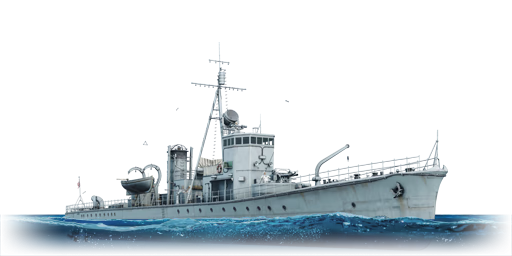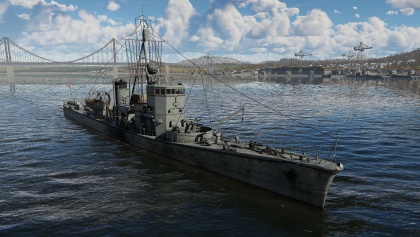Type K-3 No.1
Contents
Description
The Type K-3 No.1, Kusentei is a rank III Japanese sub-chaser
with a battle rating of 3.0 (AB/RB/SB). It was introduced in Update 1.89 "Imperial Navy".
General info
Survivability and armour
Talk about the vehicle's armour. Note the most well-defended and most vulnerable zones, e.g. the ammo magazine. Evaluate the composition of components and assemblies responsible for movement and manoeuvrability. Evaluate the survivability of the primary and secondary armaments separately. Don't forget to mention the size of the crew, which plays an important role in fleet mechanics. Save tips on preserving survivability for the "Usage in battles" section. If necessary, use a graphical template to show the most well-protected or most vulnerable points in the armour.
Mobility
Write about the ship's mobility. Evaluate its power and manoeuvrability, rudder rerouting speed, stopping speed at full tilt, with its maximum forward and reverse speed.
Armament
Primary armament
Primary weapon is a relatively low-shell-speed, high-arcing, high rate of fire dual-barrel 40mm Vickers autocannon. It's an excellent weapon for relatively quickly dispatching targets within 1.5km range, where it's high rate of fire can be used to correct lead and land number of shots before the need to reload. It's extremely useful against small fast vessels, such as hydrofoil torpedo boats. At range however the flight time becomes a near-impossible for tracking anything smaller than a sub-chaser. There is, however, one advantage to the gun at >1500m range: due to it's low shell speed gun will fire at a very high arc, allowing K-3 to be one of a very few ships within its tier capable of reaching enemies hidden behind near-vertical obstacles, making it an excellent killer for various opponents trying to hide behind the islands or other terrain obstacles.
Secondary armament
The best Anti-Air armament among Japanese Rank 1 ships, extremely useful in fending-off enemy ships, even armored gun boats, and relatively useful against air targets. The only disadvantage is in the guns layout, where at most 2 guns can be firing at a target, due to the fact that two guns amid-ship are pointing in the opposite directions, without any overlapping field of fire.
For bombers the best angle to approach K-3 (and K-7) is from a high angle, directly from the rear, where none of the weapons have any coverage.
Special armament
Depth charges, mines, rocket launchers and missiles are also effective in skilled hands and can take an off-guard opponent by surprise. Evaluate the ammunition of this type of armament and rate its performance in combat. If there are no special armaments, remove this section.
Usage in battles
K-3 will be a difficult vessel to play until unlocking fire protection system, as it's extremely easy to ignite and fires quickly dispatch it from the battlefield - for that reason when attacking Type K-3 it's highly recommended to use HE shells on every occasion. Sub Chaser's primary advantage is in a very narrow hull and an outstanding 40mm gun. The ship is so narrow in fact that it's near-impossible to hit for a motor torpedo boats when facing bow (front) or stern (rear). On the other hand, its length is one of, if not the longest in BR, being a serious issue when faced with torpedoes, therefore care should the taken to pre-emptively position oneself when engaging opponents.
The ship is best taken equipped with less than a half of a total ammunition capacity, as it's more than sufficient for a vast majority of battles, while significantly lowers the cross-section of the unarmored ammunition racks that are prone to explosions. Also ignoring depth charges is recommended due to their extremely limited usefulness while adding mass and risk of explosion to the ship.
It's generally good to have at least some HE-DF ammunition onboard, as with a rapid fire of the 40 mm Vickers it can dispatch a field of flak fire very effectively destroying enemy bombers and fighters, or at least scaring them off. Within Rank 1 battles 40 mm HE clips are a better choice than the Universal or SAP, as none of the targets will have enough armor to resist them even at 2000m, while additional explosive power increases the speed in which enemies can be destroyed.
Both: K-3 and K-7 have a relatively undefended rear arc, where at most only one 20mm anti-aircraft gun can shoot back.
Pros and cons
Pros:
- Effective 40 mm twin cannon
- Secondary armament is very powerful against small ships
- Decent anti-aircraft artillery for its battle rating
- Decent speed
Cons:
- Long ship length makes for an easy torpedo target
- Primary armament is not very effective against big ships
- Prone to catching fire
- Large turning radius
- Big size for its battle rating
History
The No.1-class submarine chasers (第一号型駆潜艇, Dai 1 Gō-gata Kusentei) were built under Maru 1 Keikaku programme, totalling 2 ships built in 1933. Vessels suffered from stability and hull strength issues that were resolved in a later redesign that became the No.4. The ship is a flush deck design with a relatively high freeboard for its size and an unproportionally large bridge. Ship's waterline length was 64 meters, width 5.6 meters for a total displacement of 383 tonnes. Crew consisted of 53 sailors, with up to 65 capacity.
Designers considered one of two primary guns against surfaced submarines: Either 8 cm/40 3rd Year Type naval gun or Type Bi-4 cm autocannon, which they've eventually picked for the final design. Both proposed guns were built domestically in Japan on a license. Additionally armament featured two imported Lewis light machine guns with the third one added during the war. Ships were equipped with 36 depth charges released overboard (projectors were added in the No.4). Additional equipment included Type 91 sonar, Type MV hydrophone, 6m motor boat and a 6m cutter, 60mm search and signal light and an additional 30mm search light.
The first ship was commissioned on 23 December 1933, numbered No.2 by the Tōkyō Ishikawajima Shipyard, followed 3 days later by No.1 from the Uraga Dock Company. Both ships participated in the events following the Marco Polo Bridge Incident in the 1938. In 1941 ships participated in the Operation M, and for the remaining of the Pacific War they've took part in convoy escorts around the region.
On 27 June 1945 No.2 was struck by a 533mm torpedo from the Balao-class submarine USS Blueback. No.1 survived the war meeting end of it in a city of Surabaya on a Philippines island of Java. It eventually was scuttled in the Singapore by the Royal Navy.
Media
Excellent additions to the article would be video guides, screenshots from the game, and photos.
See also
Ships of comparable role, configuration and era
- Type K-7 / No.4 Class (successor)
- MPK pr. 122A (USSR, 76mm + 3×12.7mm)
- 110 ft SC-497 (USA, 40mm + 3×20mm)
- Flower class (UK, 102mm + 40mm + 2×20mm)
- R-boot R-301 (GER, 20mm + 2×20mm + 37mm + 2×Torpedo)
External links
Paste links to sources and external resources, such as:
- topic on the official game forum;
- encyclopedia page on the ship;
- other literature.
| Japan sub-chasers | |
|---|---|





